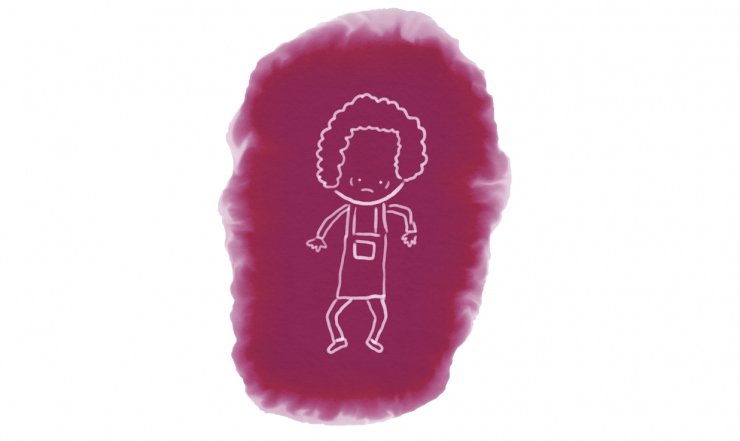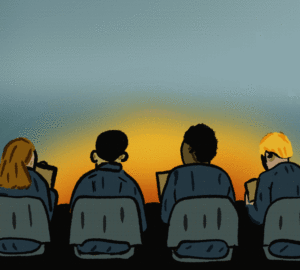
“Oh hey, I threw up in the bathroom.”
“I don’t know how many times I’ve said that,” confesses Jarboe, a barista trainer who has depression and anxiety. He’s referencing the moments he’s had bad panic attacks on bar, but didn’t feel like he could be honest about them. His vomit excuse isn’t real, he says, but in the moment is “the only thing I know that’s going to get me out of this bar shift right now,” he says.
Jarboe describes the feelings that overcome him as “a lot of dread. A lot of feeling like I’m going insane.” The worst part of it is, he says, is that you have to smile through the panic attack, lest the customer complain about poor service. “You just have to live in it. Your heart is going to be racing, you’re going to have terrible thoughts, and that’s just how it’s going to be,” he says.
Examining mental health in the workplace is not new. However, in the service industry in particular, the amount of emotional labor performed in a high-stress environment can make for a devastating, perfect storm that affects one’s health. One Substance Abuse and Mental Health Services Administration study found workers in the accommodations and food services industry to have the highest rate of substance abuse at 17%, compared to a national average of 9%. Another informal industry survey found that 84.8% of restaurant managers and kitchen staff report depression, 72.9% report anxiety, and 50% report substance abuse issues.
Dr. Maelisa Hall, licensed psychologist and owner of Hall Counseling Group in Irvine, California, specializes in workplace stress. “Dealing with people is one of the most stressful things you can do,” she says. “If you’re focused on customer service, a lot of how your day goes might depend on interactions you have with people throughout the day.”
Yet, the discussion of mental health in the specialty coffee workplace remains a rare occurrence.
A 2013 Sprudge survey on coffee professionals’ health revealed that 44% felt that their job was emotionally draining. Last year, Talor Browne surveyed coffee professionals for her Tamper Tantrum presentation, “Coffee, I love you but you’re bringing me down” and found that 66% had anxiety related to their job, while 61% dealt with persistent high stress.
Cameron*, a coffee professional who was diagnosed with bipolar disorder, borderline personality disorder, and anxiety, finds that “there’s a lot of emotional labor that’s involved in working on bar.” Getting through a bar shift and talking to people can be “enormously difficult,” often directly impacting interactions. They said, “I’ve had a lot of miscommunications with people who think you’re being rude, standoffish, or plain bitchy.”
Despite one in four people being affected by a mental or neurological disorder at some point in their lives, the stigma surrounding talking about mental health is still real and can cause a disruption in one’s career. For those in marginalized communities, culture can play an additional role, too. One study found that young adult blacks with higher education were less likely to seek out help. Another study found that social stigma and shame prevented Asian-American immigrants from seeking help. Within groups like these that are underrepresented in contemporary American coffee bars, it stands to reason that seeking help may be even more difficult than it already is.
Sharon*, a coffee professional who was diagnosed with clinical depression and bipolar disorder, found that her “first real encounter with protecting myself and standing up for myself” got her fired. After she revealed to her employer that she had had, and been successfully treated for, bipolar disorder, she says the cafe owner became very withdrawn and Sharon was later let go via a phone call.
Uncompromising employers, workplace harassment, and poor communication can all affect one’s well-being. After being sexually harassed and stalked at her workplace, Megan, a lead barista, found herself “physically unable to go to work without having panic attacks.” Her manager brushed off her anxiety and she ended up leaving the job.
In the last few years, Megan has learned to look for supportive workplace environments. “People need to feel more comfortable about having bad days,” she says. As part of her job, she notices when baristas aren’t performing at their best. Sometimes, she’ll ask them to take a short break. “It’s better to take a break than to continue to mess something up because they can’t focus on the task in front of them.” She says, “Just because somebody’s at work doesn’t mean the problems go away.”
Even if an employer does not offer mental health care, there are still many ways that a business owner can show support for understanding mental health. Noma Bruton, human resources consultant and founder of Sagacity HR in Costa Mesa, California, recommends education and training first. She says, “For a business owner to make the effort to educate themselves about this issue, is not only the right human thing to do—the kind human thing to do—but it’s going to help their business.”
Major mental disorders cost American businesses at least $193 billion annually in lost earnings. In a small business like a specialty coffee shop, this can play out as missed shifts or lower productivity levels.
Bruton says the issue is oftentimes the employer doesn’t know what’s hurting them. “They can see people working for them who are not as productive as they wish they would be,” she says. “But they don’t know what the problem is so they don’t know how to deal with the problem.”
Bruton calls the nationally offered Mental Health First Aid program “CPR for the mind.” Supporting awareness programs like Mental Health Month can also be a clear signal that you care about your employees’ wellness.
Outside of formal trainings and offering Employee Assistance Programs (EAPs), inviting a mental health professional to come in for a talk, providing information about free screenings, and wrapping stress management training into standard training programs encourages an open conversation about mental health.
Sharon says that while she hasn’t worked for any employers with official mental health policies in place, she recalls a roasting position where her manager understood “without making a big deal out of it.” She was given a flexible roasting schedule and told, “‘as long as the roasting gets done for when it needs to be done, I don’t care when you do it.’”
Dr. Hall recommends a focus on finding your own self-care routine and encouraging others to do the same. “Make sure you’ve really taken care of all your physical needs before going to work,” she says. Especially for shift work, establishing a wake-up and bedtime routine can help with maintaining consistency. During breaks, she recommends a few minutes of meditation or refocus on positive thoughts.
But the best approach to breaking the stigma about mental health in the workplace is talking about it more. Jarboe calls for more honesty on workplace struggles. Allowing colleagues to say “hey, I’m struggling today,” and not look down on them, he says, is a step in the right direction.
*Names with asterisks have been changed for privacy
Jenn Chen (@TheJennChen) is a San Francisco-based coffee marketer, writer, and photographer. Read more Jenn Chen on Sprudge.





























